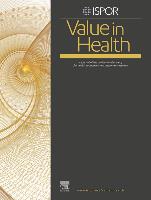Global Health Experts Examine COVID-19’s Effect on Mental Health, Cost-Effectiveness of Vaccination, Treatment Strategies and More
 Lawrenceville, NJ, USA—May 3, 2022—Value in Health, the official journal of ISPOR—The Professional Society for Health Economics and Outcomes Research, announced today the publication of a series of articles examining the COVID-19 pandemic from a health economics perspective and identifying emerging topics in COVID-19 health economics. The series was published in the May 2022 issue of Value in Health.
Lawrenceville, NJ, USA—May 3, 2022—Value in Health, the official journal of ISPOR—The Professional Society for Health Economics and Outcomes Research, announced today the publication of a series of articles examining the COVID-19 pandemic from a health economics perspective and identifying emerging topics in COVID-19 health economics. The series was published in the May 2022 issue of Value in Health.
Following previous collections on this topic published in the November 2020 and May 2021 issues of Value in Health, this themed section describes several distinct COVID-19 health and health economics impacts across multiple pandemic stages since the World Health Organization declared COVID-19 a global pandemic on March 11, 2020.
“With the COVID-19 pandemic potentially—and hopefully—entering a new phase defined by an endemic-like situation, the role of health economics in decision making is likely going to increase,” said guest editors Maarten J. Postma, PhD; University of Groningen, University Medical Center Groningen; Groningen, The Netherlands, and Jagpreet Chhatwal, PhD, Massachusetts General Hospital and Harvard Medical School; Boston, MA, USA. “Specific analyses on resource utilization by COVID-19 patients, such as those featured in this themed section, will support the evaluation of the cost-effectiveness of COVID-19 interventions,” said Postma and Chhatwal.
In their introductory editorial, “COVID-19 Health Economics: Looking Back and Scoping the Future,” the guest editors include a brief history of several COVID-19 response stages and introduce the 11 articles in the series:
- “Diagnostics and Treatments of COVID-19: A Living Systematic Review of Economic Evaluations,” by Jamie Elvidge, Ashley Summerfield, David Nicholls, and Dalia Dawoud
- “Quantifying the Effect of Public Activity Intervention Policies on COVID-19 Pandemic Containment Using Epidemiological Data From 145 Countries,” by Jichao Sun, Yefeng Zheng, Wenhua Liang, et al
- “Quality-Adjusted Life-Years Lost Due to COVID-19 Mortality: Methods and Application for The Netherlands,” by Brian Wouterse, Frederique Ram, and Pieter van Baal
- “The Effects of Sever Acute Respiratory Syndrome Coronavirus 2 on the Reported Mental Health Symptoms of Nonprofessional Carers: An Analysis Across Europe,” by Luis Maria Peña-Longobardo, Juan Oliva, and Beatriz Rodriguez-Sánchez
- “Immunogenicity and Safety of the COVID-19 Vaccines Compared to Control in Healthy Adults: A Qualitative and Systematic Review,” by Oscar Lau and Nirma Vadlamudi
- “Heterologous COVID-19 Vaccination in Spain: A Case Study of Individual Autonomy in the Real World,” by Rafael Dal Re, Magi Farré, and M. Isabel Lucena
- “Effectiveness of Systemic Corticosteroids Therapy for Nonsevere COVID-19 Patients: A Multicenter, Retrospective, Longitudinal Cohort Study,” by Zhenyuan Chen, Xiaoxv Yin, Xiangping Tan, et al
- “Cost-Effectiveness of Remdesivir for COVID-19 Treatment: What Are We Missing?” by Jagpreet Chhatwal and Anirban Basu
- “A Cost-Effectiveness Analysis of Remdesivir for the Treatment of Hospitalized Patients With COVID-19 in England and Wales,” by Rachid Rafia, Marrissa Martyn-St James, Sue Harnan, Andrew Metry, Jean Hamilton, and Allan J. Wailoo
- “The Cost-Effectiveness of Remdesivir for Hospitalized Patients With COVID-19,” by Melanie Whittington, Steven Pearson, David Rind, and Jonathan Campbell
- “Healthcare Resource Utilization of COVID-19 Patients Visiting US Hospitals,” by Rena Moon, Harold Brown, and Ning Rosenthal
“In summary, this COVID-19 themed section highlights several important topics, including COVID-19’s effect on mental health, autonomous choices in vaccine boosting to optimize coverage, the cost-effectiveness of different vaccination and treatment strategies, and clinical utilities of dynamic testing approaches,” said Postma and Chhatwal. “Future studies could evaluate the cost-effectiveness of the frequency and type of COVID-19 boosters and the value of COVID-19 testing and treatment in different settings as we enter the post pandemic phase of COVID-19.”
###
ABOUT ISPOR
ISPOR, the professional society for health economics and outcomes research (HEOR), is an international, multistakeholder, nonprofit dedicated to advancing HEOR excellence to improve decision making for health globally. The Society is the leading source for scientific conferences, peer-reviewed and MEDLINE®-indexed publications, good practices guidance, education, collaboration, and tools/resources in the field.
Website | LinkedIn | Twitter (@ispororg) | YouTube | Facebook | Instagram
ABOUT VALUE IN HEALTH
Value in Health (ISSN 1098-3015) is an international, indexed journal that publishes original research and health policy articles that advance the field of health economics and outcomes research to help healthcare leaders make evidence-based decisions. The journal’s 2020 impact factor score is 5.725 and its 5-year impact factor score is 6.932. Value in Health is ranked 4th of 98 journals in health policy and services, 9th of 108 journals in healthcare sciences and services, and 24th of 376 journals in economics. Value in Health is a monthly publication that circulates to more than 10,000 readers around the world.
Website | Twitter (@isporjournals)